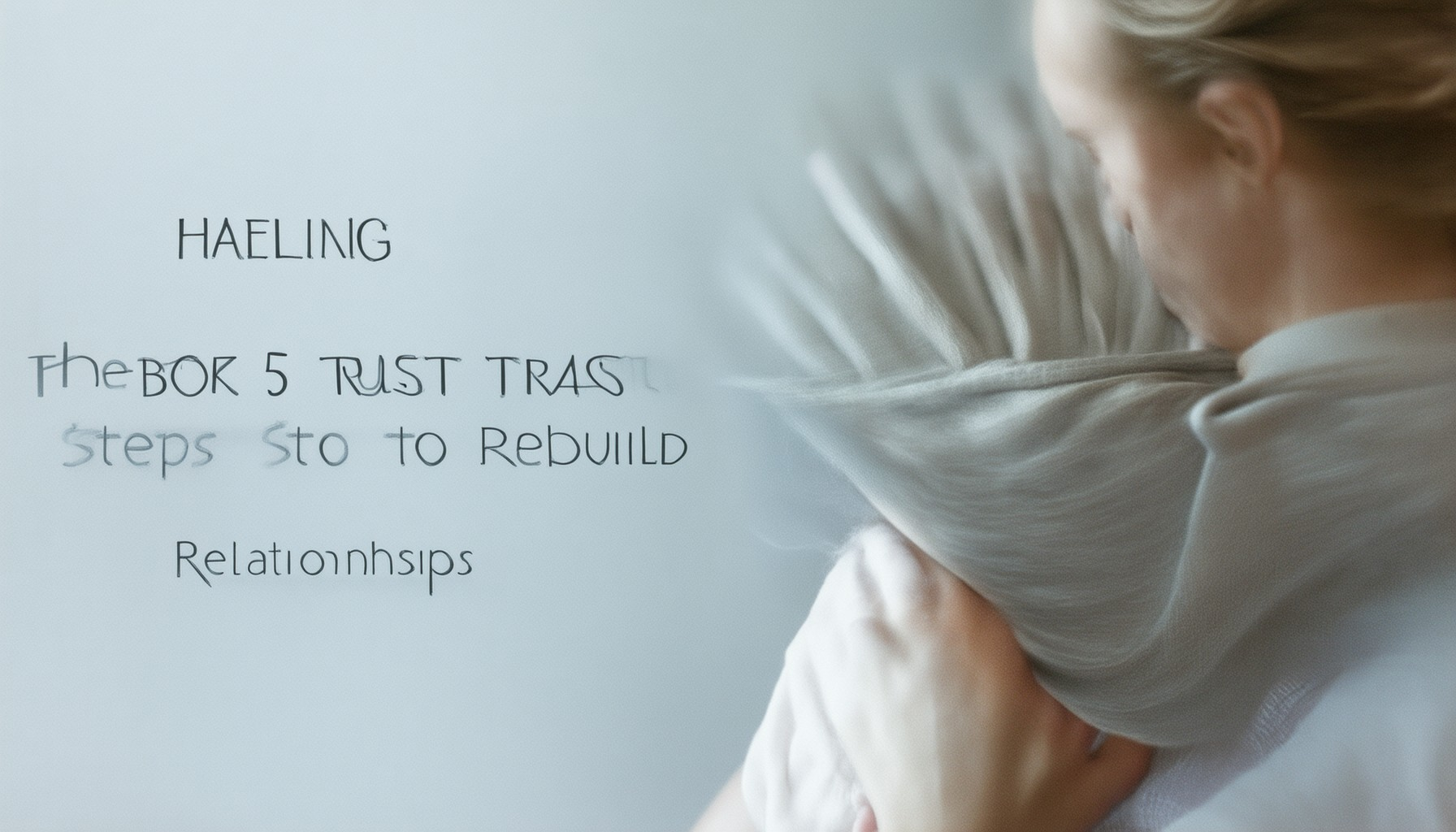In every relationship, trust is the foundation upon which meaningful connections are built. However, when trust is broken, it can leave individuals feeling uncertain, disconnected, and even hopeless about repairing the bond they once shared. Whether you’re working through a broken trust due to infidelity, miscommunication, or other issues, rebuilding trust is a complex but rewarding journey that requires patience, self-awareness, and a commitment to growth. This article dives into the strategies and insights needed to mend fractured relationships, exploring how to rebuild trust step-by-step, understand the factors that contribute to trust breakdowns, and discover ways to foster lasting connection.
How to Fix a Relationship With Trust Issues
To repair trust issues in a relationship, it’s essential to approach the situation thoughtfully and systematically. Here’s a guide to help you navigate the process:
- Initiate Open Communication
- Demonstrate Reliability
- Address Past Betrayals
- Work Together to Build Mutual Respect
- Schedule Regular Check-Ins
- Be Patient and Understanding
- Seek Professional Support if Needed
Start by having an honest and non-confrontational conversation about what went wrong. Express your feelings without blaming your partner, and listen actively to theirs. This can help clarify misunderstandings and identify underlying issues.
Consistently show that you can be trusted. Keep promises, follow through on commitments, and be transparent about your actions. Over time, this builds credibility and reinforces trust.
If there have been past incidents that hurt your partner, acknowledge them without making excuses. Apologize sincerely and show willingness to learn from those mistakes to prevent repetition.
Trust takes time to rebuild, so focus on building mutual respect and understanding. Engage in activities that strengthen your emotional connection, such as shared hobbies or meaningful discussions.
Establish a routine for discussing important aspects of your relationship. This helps maintain transparency and ensures ongoing trust-building efforts.
Rebuilding trust isn’t a quick process. Be patient with yourself and your partner, and celebrate small progressions. Avoid pressuring your partner to move too quickly.
If trust issues persist, consider couples therapy or counseling. A professional can provide tailored strategies and mediate constructive conversations.
Remember, trust is a foundation that requires consistent effort to maintain. By addressing issues with empathy and commitment, you can work towards a stronger, more resilient relationship.
How to Build Trust in a Relationship
Building trust in a relationship is essential for fostering strong connections and mutual respect. Here are some key steps to help you achieve this:
- Be Honest and Consistent :
Truthfulness is the foundation of trust. Be open and transparent about your intentions, thoughts, and feelings. Consistency in your actions aligns with your words, reinforcing trust over time. - Practice Open Communication :
Engage in meaningful conversations where you listen actively and share honestly. Show genuine interest in the other person’s perspective by asking questions and reflecting their thoughts. - Be Reliable :
Follow through on promises and commitments. Punctuality and dependability build credibility, which is crucial for trust. Address mistakes gracefully and demonstrate a willingness to learn and grow. - Respect Boundaries :
Understand and honor the other person’s boundaries. Recognize their comfort levels and avoid pressuring them into situations they’re not comfortable with. - Show Empathy :
Try to understand the other person’s emotions and viewpoints. Demonstrating compassion fosters deep connections and mutual respect. - Be Patient and Understanding :
Trust develops over time through consistent positive interactions. Avoid rushing the process and be attentive to signs of growing trust. - Offer Mutual Support :
Be there for each other during challenges and celebrate successes together. Balance your support with respect for their autonomy.
By integrating these elements, you can cultivate a trusting relationship that thrives on honesty, communication, and mutual respect.
What Are the 3 C’s of Trust in a Relationship?
In any relationship, establishing trust is crucial for its longevity and strength. The foundation of trust is built upon three key components:
- Communication : Open and honest dialogue fosters understanding and strengthens connections. Effective communication ensures that both parties feel heard and valued.
- Compromise : Healthy relationships require mutual flexibility. Compromise involves finding common ground and being willing to adjust for the sake of the relationship.
- Commitment : This is the dedication to working through challenges and staying invested in the relationship despite difficulties.
These elements work synergistically to create a solid framework for trust, allowing relationships to thrive. By prioritizing these Cs, individuals can cultivate deeper, more meaningful connections.
For more insights into building and maintaining trust, explore our Chris and One resources and guides on relationship growth. Discover practical tips and expert advice to enhance your emotional bonds today!
What Are the 4 Keys to Building Trust?
Building trust is essential for fostering strong relationships and successful collaborations. Below are the four key pillars that contribute to earning trust:
- Consistency and Reliability
- Consistently delivering on promises creates a track record of dependability.
- Being reliable ensures that others can count on you, whether in-person or online.
- Example: A service provider who consistently meets deadlines and achieves goals builds trust over time.
-
Communication and Transparency
- Open and honest communication fosters mutual understanding.
- Being transparent about challenges, successes, and intentions helps others feel involved.
- Example: Sharing updates and concerns during a project keeps stakeholders informed and engaged.
-
Empathy and Understanding
- Showing genuine care for others’ needs and perspectives strengthens connections.
- Understanding and respecting diverse viewpoints promotes collaboration.
- Example: A leader who listens to team members and adapts their approach based on feedback builds trust.
-
Accountability and Integrity
- Taking responsibility for actions and outcomes demonstrates maturity.
- Maintaining integrity ensures that words and actions align.
- Example: Admitting mistakes and correcting them shows accountability and reinforces trust.
By focusing on these four keys, individuals and organizations can cultivate environments where trust flourishes, leading to more productive and meaningful interactions.
What Are the 4 Blocks of Trust?
The foundation of trust is built upon four essential pillars, each contributing uniquely to fostering reliability and connection between individuals or entities. These pillars are rooted in psychological principles and social dynamics, guiding us to understand how trust is established and maintained.
- Credibility :
Credibility is the cornerstone of trust, serving as a gauge of integrity and expertise. It encompasses honesty, transparency, and consistency in actions and words. When someone is perceived as credible, others are more likely to rely on their judgment and recommendations. Credibility is earned through consistent delivery of quality outcomes, adherence to ethical standards, and open communication. - Reliability :
Reliability ensures that expectations are met consistently over time. It involves dependability, commitment, and the ability to follow through on promises. A reliable individual or entity is seen as dependable, capable of handling responsibilities effectively, and committed to maintaining stability and order. Reliability builds confidence in one’s ability to perform reliably under various conditions. - Intimacy :
Intimacy refers to the emotional connection and mutual vulnerability that foster deep trust. It involves empathy, understanding, and the ability to connect on a personal level. Intimate relationships are characterized by trust, respect, and the willingness to be open and honest. Intimacy helps bridge gaps and creates a sense of belonging and security. - Self-Orientation :
Self-orientation is the awareness and alignment of one’s actions with the greater good rather than personal gain. It involves ethical decision-making, prioritizing the needs of others, and demonstrating a commitment to shared values. Self-oriented individuals are often viewed as authentic and genuinely concerned with the well-being of those around them, which strengthens trust.
By mastering these four blocks—credibility, reliability, intimacy, and self-orientation—we can cultivate deeper connections and build stronger, more meaningful relationships.
What is the key to rebuilding trust?
Rebuilding trust is essential for fostering strong relationships whether personal or professional. Here are the key steps to effectively restore trust:
1. Be Honest and Transparent
Honesty is the foundation of trust. Being open and truthful about your intentions, actions, and mistakes builds credibility. Transparency fosters trust by showing that you have nothing to hide.
2. Follow Through on Promises
Consistency is key. If you make a commitment, follow through on it. Reliability establishes trust and shows that you can be counted on regardless of the circumstances.
3. Show Empathy and Listen Actively
Understanding others’ feelings and perspectives is crucial. Active listening demonstrates that you value their input and concerns, which strengthens trust.
4. Admit Mistakes Gracefully
Accountability is vital. Acknowledge errors and take responsibility for them. A sincere apology can go a long way in repairing trust and showing that you are committed to doing better.
5. Build Trust Over Time
Trust doesn’t repair overnight. It requires consistent effort, patience, and understanding. By focusing on these elements, you can gradually rebuild and strengthen trust in any relationship.
Remember, trust is a two-way street. By being reliable, empathetic, and honest, you create an environment where trust can flourish and grow over time.









0 Comments